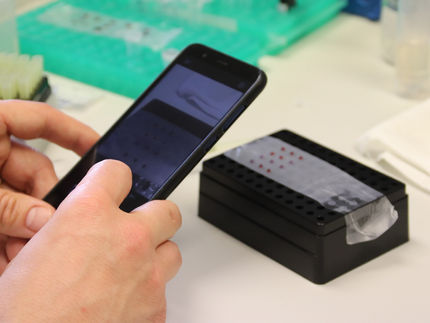Breakthrough for the treatment of celiac disease
Development and clinical testing of a first effective drug
Advertisement
A team of researchers led by Professor Dr. Dr. Detlef Schuppan, Director of the Institute of Translational Immunology at University Medical Center Mainz, has developed a novel drug for the treatment of gluten intolerance (celiac disease): the transglutaminase inhibitor ZED1227. The drug is based on a disease-specific mechanism of action. To date, the only effective treatment option for those affected is a strict gluten-free diet. In a Phase 2a clinical trial, the Mainz scientists, together with international colleagues, have shown that ZED1227 has a strong protective effect on the mucosa of the small intestine and improves inflammation, disease symptoms and the quality of life of those affected. This makes ZED1227 the first celiac disease drug for which clinical efficacy has been demonstrated.

Symbolic image
pixabay.com
"Celiac disease patients experience considerable suffering due to the permanent need for dietary caution. With the transglutaminase inhibitor ZED1227, there is hope for a drug treatment option to support the gluten-free diet, which will also provide them with a considerable gain in safety and quality of life," explains Professor Detlef Schuppan, who is the lead author of the study together with Professor Markku Mäki (Tampere, Finland). Professor Schuppan heads the outpatient clinic for celiac disease and small intestinal disorders at the University Medical Center Mainz, a nationwide and international reference center for the care of patients with celiac disease and complex small intestinal disorders, including patients with the therapy-resistant and complicated forms of the disease.
Celiac disease is one of the most common inflammatory diseases of the small intestine. It affects nearly one percent of the population worldwide. The autoimmune disease is caused by the consumption of gluten, the major protein found in various grains such as wheat, rye, barley and spelt. The disease can cause various symptoms, for example diarrhea or abdominal pain, but also a variety of symptoms outside the intestine, including various autoimmune diseases.
The inflammation of the inner lining (mucous membrane) of the small intestine can be triggered by even the smallest amounts of gluten-containing foods. With repeated gluten ingestion, the so-called villi, the protrusions of the mucous membrane of the small intestine, regress. This reduces the surface area of the intestinal mucosa. As a result, those affected can absorb fewer nutrients from food. If left untreated, celiac disease can lead to serious complications such as anemia, bone loss, growth retardation, infertility and even small intestinal tumors.
The development of the novel celiac disease drug ZED1227 was funded as a beacon project by the German Federal Ministry of Education and Research as part of the Cluster of Excellence for Individualized Immune Intervention (Ci3).
In the currently published efficacy study, participating patients voluntarily underwent daily gluten challenge and two endoscopies. The drug ZED1227 was administered as a tablet in three different doses. A fourth group of patients received a placebo. The drug prevented gluten-related inflammation and villous atrophy at each dose. The highest dose proved to be the most effective. In addition, symptoms typical of celiac disease and perceived quality of life improved with each dose of the drug.
Twenty clinical centers in seven European countries were involved in patient recruitment for the Phase 2a study. In addition to Mainz, Tampere (Finland) and Oslo (Norway) treated most of the 160 patients in the study.
"Together with my study collaborators, Dr. Tina Friesing-Sosnik and Sibylle Neufang, I am very grateful to the patients of our Mainz celiac disease clinic who volunteered so willingly and with such dedication for this study," emphasizes Professor Schuppan.
The new therapeutic approach with the drug ZED1227 is based on the research of Professor Detlef Schuppan on the disease-specific mechanisms in celiac disease. The endogenous enzyme transglutaminase (TG2), that he discovered as autoantigen of celiac disease more than 20 years ago, and that is found throughout the intestine, plays a key role in the disease. Patients with celiac disease develop TG2 auto-antibodies against transglutaminase. These are highly elevated in the blood of celiac patients with active disease, a test that is now used worldwide to identify patients with active celiac disease.
Gluten is not completely digested in the GI tract. Undigested gluten fragments are absorbed by the mucosa of the small intestine. These gluten fragments react with TG2 in the intestinal lining. This reaction alters ("deamidates") the gluten fragments so that their pro-inflammatory effect in the intestinal mucosa is greatly increased. However, this only affects celiac disease patients, who have a special genetic predisposition that allows this inflammatory reaction. The new drug substance, the so-called "small molecule" ZED1227, was developed to inhibit the excessive activity of the enzyme TG2 in the mucosa of the small intestine and thus prevent the inflammation caused by gluten.
The drug was developed by the Mainz researchers in collaboration with the companies Zedira GmbH (Darmstadt) and Dr. Falk Pharma GmbH (Freiburg).
Based on the promising results of the Phase 2a study, a larger Phase 2b follow-up study is planned starting in the fall of 2021 with the particularly burdened patient group that does not respond to the gluten-free diet.
Original publication
Schuppan D, Mäki M, Lundin KEA, Isola J, Friesing-Sosnik T, Taavela J, Popp A, Koskenpato J, Langhorst J, Hovde Ø, Lähdeaho ML, Fusco S, Schumann M, Török HP, Kupcinskas J, Zopf Y, Lohse AW, Scheinin M, Kull K, Biedermann L, Byrnes V, Stallmach A, Jahnsen J, Zeitz J, Mohrbacher R, Greinwald R; CEC-3 Trial Group; "A Randomized Trial of a Transglutaminase 2 Inhibitor for Celiac Disease"; N Engl J Med; 2021;385:35-45.



















































